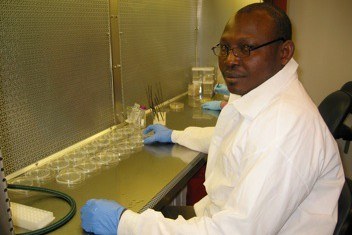
Nicolas Niemenak
by Nicolas Niemenak
Associate Professor, Higher Teacher's Training College, University of Yaounde I, Cameroon. Former Humboldt Fellow and Fulbright Scholar, Visiting Scientist to Guiltinan Lab, 2010-2011
Embryogenesis is a critical process in the life cycle of higher plants, providing the link between two sporophytic generations. Zygotic embryogenesis encompassed the early morphogenesis process during which the embryo body plan is formed with shoot and root apical meristems; and the maturation phase during which the embryo accumulates storage compounds and acquires the capacity to withstand desiccation. Asexually-derived embryos can be induced in vitro from a wide range of somatic and gametophytic donor tissues. The transition of somatic cells into cells that are embryogenically competent is the first and crucial step in somatic embryogenesis.
In cacao, we recently showed that somatic embryos can be produced in large scale using temporary immersion bioreactor system (TIS). This system allows for an increase in embryo numbers and quality (Niemenak et al. 2008). Work is presently focused on embryo germination and the establishment of plantlets. In order for cacao somatic embryogenesis to reach its full potential, the somatic embryos produced must not only be viable but must exhibit adequate and predictable growth. The composition of the maturation medium can be altered to produce somatic embryos with comparable levels of stored lipid, starch and protein with those found in mature zygotic embryos. These embryos should achieve comparable desiccation tolerance and late embryogenic gene expression. Major physiological changes occur in embryos during partial dry treatment. The second objective of our project is to monitor the expression patterns of proteomics changes induced by different maturation and desiccation treatments (sucrose, ABA and PEG) with the goal of identifying molecular markers associated with increased conversion frequency.

